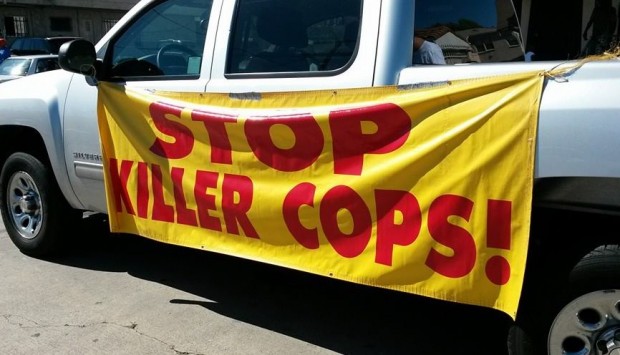 This is from a month ago, and we found out about it because the former Lt. Governor of South Carolina who is about to become the Dean of the University of Charlotte – to wide protest because of his racist stances – once hawked Bessinger’s crap during a boycott of it.
This is from a month ago, and we found out about it because the former Lt. Governor of South Carolina who is about to become the Dean of the University of Charlotte – to wide protest because of his racist stances – once hawked Bessinger’s crap during a boycott of it.
The State
Maurice Bessinger, who was as famous for his barbecue shops and sauces as he was for his diehard segregation stands, has died at 83.
Bessinger in many ways had a background as American as the tasty Southern food his establishments were known for. He was a Korean War veteran and businessman who grew a restaurant business that employed 200 people, as well as a devout Baptist who supported missionaries abroad.
“I’m just a fair man. I want to be known as a hard-working, Christian man that loves God and wants to further (God’s) work throughout the world as I have been doing throughout the last 25 years,” he told The State newspaper in 2000.
But he was also known for his deeply divisive racial stands and flying Confederate flags at his restaurants. The second generation of his family now running the restaurants took the last of those flags down a few months ago.
“He is a striking reminder of someone who is unapologetic for the positions he took, and the positions he took in 1963 and 1964 were not widely challenged by most white South Carolinians,” said University of South Carolina associate professor of history Bobby Donaldson, who specializes in civil rights.
In 2000, after The State newspaper disclosed that Bessinger was distributing pro-slavery tracts at his Maurice’s Gourmet Barbecue headquarters in West Columbia – under the shadow of the enormous Confederate flag he flew outside – people began boycotting his eateries.
Stores including Walmart and the U.S. military pulled his well-known mustard barbecue sauce from their shelves. Bessinger later would claim the boycott cost him $20 million. In his 2001 biography, “Defending My Heritage,” Bessinger blamed media reports for the loss of business.
At the time, Bessinger was distributing pro-slavery audiotapes and gave customers a discount if they bought his literature. South Carolina had “biblical slavery,” Bessinger claimed, which was kinder and different than other forms of slavery.
Bessinger established his Piggie Park Enterprises in Cayce in 1953. In the 1950s and 1960s, Bessinger put signs in his stores saying blacks weren’t welcome.
In 1963, Bessinger became angry at a Spartanburg restaurant owner who had integrated his restaurant. Bessinger met with other restaurant owners to force the man to resign as president of the S.C. Restaurant Association — a group he later led as president.
In 1964, Bessinger ran for the S.C. House. He lost by about 100 votes and blamed his defeat on what he called the “Shandon Mafia” – an “exclusive elite section of Columbia” that had “large numbers of out-of-staters, college professors, government officials and other liberals,” according to his biography.
Also in 1964, Bessinger — who at that time owned four Piggie Park restaurants — stood in the door of one of his stores to prevent a black minister from entering. Bessinger would allow blacks to buy food to take out, but not to eat in his restaurant. African-Americans, represented by then-civil rights lawyer Matthew Perry, took him to court.
In 1968, the U.S. Supreme Court ruled against Bessinger 8-0.
Ironically, that Supreme Court opinion — Newman vs. Piggie Park Enterprises — enshrined in law the concept that lawyers who win civil rights cases are entitled to have their attorneys’ fees paid by the loser. “If successful plaintiffs were routinely forced to bear their own attorney’s fees, few aggrieved parties would be in a position to advance the public interest by” going to court, the Supreme Court said, according to the book “Matthew J. Perry” by Lewis Burke and Belinda Gergel.
In 2000, Bessinger told a reporter with The State he had no regrets about fighting that lawsuit.
“It is really a constitutional right — whether a man has the right to run his business without governmental interference,” he said at the time.
Throughout his life, Bessinger — who ran unsuccessfully for governor in 1974 riding a white horse and wearing a white suit — insisted he wasn’t anti-black, but that he was pro-private property rights and pro-state sovereignty.
“This is not about race,” he said in his 2001 biography.
But Bessinger actually helped South Carolina’s civil rights fighters, Donaldson said, because his public stands in news accounts drew supporters to the civil rights side.
“The more Bessinger drew a line in the sand, it actually enabled the movement here to get traction,” Donaldson said.
The chain of Bessinger’s restaurants is now in the hands of his family’s second generation.
A few months ago, they pulled down the last two of the Confederate flags that once flew proudly over his restaurants.
In an interview with The State in October, son Lloyd Bessinger said he was purposely shifting away from the politics that were important to his father and moving toward focusing on the business.
The family-run business wants to stay neutral and appeal to people, whatever their political party, he said.
“Dad liked politics,” Lloyd Bessinger told The State. “That’s not something we’re interested in doing. We want to serve great barbecue.”
Bessinger is survived by his wife of 61 years, Barbara Williams Bessinger, along with two sons and two daughters, grandchildren and great-grandchildren.
Read more here: http://www.thestate.com/2014/02/24/3288326/barbecue-eatery-owner-segregationist.html#storylink=cpy


More Stories
Muhammad Ali – Rest in Peace
WHITE SUPREMACIST JOYCE WEIGEL DEAD
TYLER COLE, ROT IN HELL!